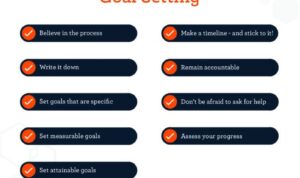Self-Improvement Tips: Ready to level up your life? Dive into the world of personal growth with our expert tips and tricks that will inspire and motivate you to become the best version of yourself.
From setting achievable goals to developing healthy habits and boosting self-confidence, we’ve got you covered with everything you need to know about self-improvement.
Benefits of Self-Improvement
Self-improvement is crucial for personal growth as it allows individuals to enhance their skills, knowledge, and overall well-being. By actively working on oneself, people can strive to become the best version of themselves and achieve their full potential.
Increased Confidence and Self-Esteem
- Self-improvement activities such as setting and achieving goals can boost confidence levels.
- Learning new skills and overcoming challenges can lead to a greater sense of accomplishment.
- Improving oneself can help individuals develop a positive self-image and belief in their abilities.
Enhanced Mental Health
- Engaging in self-improvement practices like mindfulness or meditation can reduce stress and anxiety.
- Setting boundaries and improving communication skills can lead to healthier relationships and reduced conflict.
- Self-reflection and personal growth can contribute to a greater sense of purpose and fulfillment in life.
Setting Achievable Goals
Setting achievable goals is crucial for successful self-improvement. It’s essential to have a clear vision of what you want to achieve and to break down your goals into manageable steps to avoid feeling overwhelmed.
Breaking Down Goals
Breaking down larger goals into smaller tasks makes them more attainable. By dividing your goals into actionable steps, you can track your progress more effectively and stay motivated throughout the process.
- Start by defining your ultimate goal and then identify the smaller milestones you need to reach along the way.
- Create a timeline with deadlines for each milestone to keep yourself accountable and on track.
- Celebrate each small victory to maintain momentum and boost your confidence as you progress.
Staying Motivated
Staying motivated while working towards your self-improvement goals can be challenging, but there are strategies to help you stay focused and driven.
- Visualize your end goal and remind yourself why you started on this journey in the first place.
- Find a support system or accountability partner to keep you motivated and provide encouragement along the way.
- Reward yourself for reaching milestones and stay positive even in the face of setbacks.
Developing Healthy Habits: Self-Improvement Tips

When it comes to self-improvement, developing healthy habits plays a crucial role in achieving personal growth and overall well-being. These habits not only contribute to physical health but also have a positive impact on mental and emotional health.
Examples of Healthy Habits:
- Eating a balanced diet rich in fruits, vegetables, and whole grains.
- Regular exercise routine to stay active and maintain physical fitness.
- Practicing mindfulness and meditation to reduce stress and improve mental clarity.
- Getting an adequate amount of sleep each night for rest and rejuvenation.
- Hydrating by drinking enough water throughout the day to support bodily functions.
Tips to Cultivate and Maintain Healthy Habits:
- Start small and gradually incorporate one healthy habit at a time into your routine.
- Set specific and achievable goals related to the healthy habits you want to develop.
- Stay consistent and create a daily or weekly schedule to prioritize these habits.
- Find a support system or accountability partner to help you stay motivated and on track.
- Celebrate your progress and reward yourself for sticking to your healthy habits.
Enhancing Self-Confidence

When it comes to self-improvement, enhancing self-confidence plays a crucial role in achieving personal growth and success. Self-confidence is the belief in oneself and one’s abilities, which can be cultivated through various personal development techniques.
Techniques for Boosting Self-Confidence
- Set realistic goals: Break down larger goals into smaller, achievable tasks to build confidence with each accomplishment.
- Practice self-care: Taking care of your physical and mental well-being can boost self-confidence and overall positivity.
- Acknowledge your strengths: Focus on your strengths and past successes to reinforce a positive self-image.
- Challenge negative thoughts: Replace self-doubt and criticism with positive affirmations and constructive feedback.
- Step out of your comfort zone: Trying new experiences and facing fears can help build resilience and confidence in your abilities.
Impact of Self-Confidence on Well-Being and Success
Self-confidence not only improves how you perceive yourself but also influences how others perceive you. It can lead to better relationships, career advancement, and a more fulfilling life overall. Individuals with high self-confidence are more likely to take risks, pursue opportunities, and overcome challenges with resilience.
Overcoming Procrastination
Procrastination is a common hurdle in the journey of self-improvement. It often stems from factors like fear of failure, lack of motivation, or feeling overwhelmed by tasks.
Identify Common Reasons for Procrastination
- Fear of failure: Sometimes, the fear of not meeting expectations can lead to putting off tasks.
- Lack of motivation: When there is no clear incentive or goal, it’s easy to procrastinate.
- Feeling overwhelmed: A sense of being overwhelmed by the magnitude of a task can result in procrastination.
Strategies for Overcoming Procrastination
- Break tasks into smaller steps: Divide tasks into manageable chunks to make them less daunting.
- Set deadlines: Establish deadlines for each task to create a sense of urgency and accountability.
- Use the 2-minute rule: Start a task and commit to it for just 2 minutes, often leading to further progress.
Creating a Conducive Environment for Motivation and Focus, Self-Improvement Tips
- Eliminate distractions: Identify and remove any distractions that may hinder your focus.
- Establish a routine: Develop a consistent routine that includes time for self-reflection and goal setting.
- Reward yourself: Celebrate small victories along the way to keep yourself motivated and on track.



